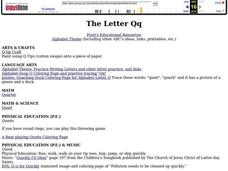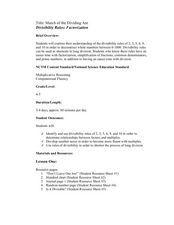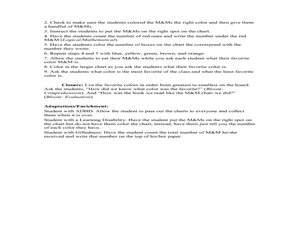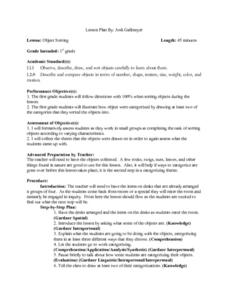Curated OER
Free Printables: Alphabet Cards
In this alphabet activity, students cut out the alphabet cards, which have words and pictures to go along with each letter. This activity generator can print off 2 different sets of cards for the alphabet so that students can match up...
Curated OER
The Letter Qq
Students complete a variety of activities to examine the uses for the letter Q. In this letter theme lesson, students complete arts and crafts, language arts, math, physical education, music, science, home economics, social studies, and...
Curated OER
Percentages Introduction
In this percentages worksheet, students color 25% of 100 small squares blue, 35% red and 30% yellow. Students figure out how many squares they have left and then what percent of the 100 squares are left. Students then work out 5...
Curated OER
Different Minerals
In this minerals worksheet, students read about the relationship between elements, rocks and minerals. They experiment using 6 different colored gumdrops to represent 6 common elements. Students construct gumdrop and toothpick models of...
Curated OER
Arthropod Coloring
In this arthropod activity, learners compare and contrast the different animals found in the Phylum Arthropoda: insects, arachnids, and crustaceans. Students complete 8 fill in the blank statements and color illustrations.
Curated OER
The Effects of the Calcium Ion on Cooked Dry Beans
Students investigate the effects of calcium ions on the quality characteristics of cooked dry beans. In this calcium ion and dry bean investigation lesson plan, students soak dry beans using 2 different soaking techniques and 2 different...
Curated OER
March of the Dividing Ant
Learners inspect divisibility rules. In this divisibility rules lesson, students study the relationship between factorization and the divisibility rules for 2, 3, 5, 6, 9, and 10. Learners read One Hundred Hungry Ants and A Remainder of...
Curated OER
Beans and Birds: A Natural Selection Simulation
Students solve the following problem concerning the evolution of seed color in pinto bean plants: "How does natural selection change the frequency of genes or traits over many generations?" They use the constructivist approach to...
Curated OER
Circle Up Your M&Ms
Fifth graders estimate how many M&Ms are in a pre-counted bag. They determine how many colored M&Ms are in a bag, then decide which of the two, bar graph or circle graph (in this case, circle graph) would be best to show te results.
Curated OER
Design Engineer Problem
Students design a flower-pot and saucer. In this math lesson, students incorporate the use of technology to correctly build and shape a flower pot. They calculate the necessary mass of the red clay used to make the pot.
Curated OER
Global Distribution of Water
In this water instructional activity, students are given the percent of distribution of water on earth. With the total amount of water equal to 1,000ml students determine the number of ml for each type of water on earth and color a...
Curated OER
Air Pollution:What's the Solution?-Weather's Role
In this air pollution and weather worksheet, students collect data using an online animation to determine the air quality at given times along with the wind speed and temperature in a particular city. Students make 3 bar graphs using the...
Curated OER
Patterns
Fourth graders investigate patterns and sequences. In this patterns and sequences lesson, 4th graders use a hundreds chart to build recurring patterns. Students skip count by threes and fives on a hundreds chart by coloring...
Curated OER
United States Identifier
Fifth graders examine and research a major region of the Unites States in groups of four. In addition, they locate the states, capitals, mammals and two bodies of water or mountain ranges found within their region. After the research,...
Curated OER
Dinoset 2: Counting By 2's And 5's
Second graders practice counting by 2's and 5's. They complete five math problems counting by 2's and five math problems counting by 5's. They play a game by typing in a number that belongs in an egg and play By Five's to a 100.
Curated OER
The Peppered Moth
In this evolution worksheet, students read about the changes the peppered moth went through over 100 year time period. Students complete 3 short answer questions based on what they read.
Curated OER
Spaceship math Multiplication 1-12
For this multiplication worksheet, students solve 40 problems where they find the product where the factors are the numbers 1 through 12. Space is provided at the bottom of the page to record a goal, the number of problems complete and...
Curated OER
M&M Counting Chart
Students practice classifying objects while utilizing candy. In this sorting lesson, students observe an assortment of M&M's and analyze the candy based on color. Students create a color chart based on the number of different...
Curated OER
The Changing Me
Third graders study the human body. In this health lesson, 3rd graders discuss that everyone's body is growing, measure body parts using a tape measure, and color the body worksheet.
Curated OER
Mollusks
In this mollusks instructional activity, students color several figures and label them with the correct parts. They complete 14 short answer questions related to mollusks.
Curated OER
Comparing Solids, Liquids, and Gases
In this solids, liquids and gases activity, high schoolers observe a teacher demonstration about gases and they experiment with liquids to show diffusion, shape and volume. They answer nine questions about the experiments related to...
Curated OER
Build A Skittles Graph
Students explore graphing. In this graphing lesson, students sort Skittles candies and use the color groups to create a bar graph. Rubrics and extension activities are provided.
Curated OER
Equilibrium: What Is It?
Tenth graders investigate chemical, physical and mechanical equilibrium. In this equilibrium lesson, 10th graders participate in a physical activity to show equilibrium by some students standing and some students sitting at the same...
Curated OER
Object Sorting
First graders follow directions when sorting objects. They illustrate how objects are categorized by drawing at least two of the categories that they sorted the objects into. Students work in small groups at completing the task of...

























